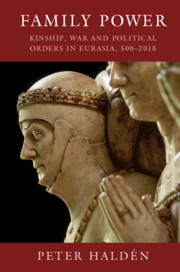Book contents
- Family Power
- Family Power
- Copyright page
- Contents
- Preface and Acknowledgements
- Chronology
- 1 Introduction
- 2 How Social Science Separated Families from Political Order
- 3 Formless Kinship in Formless Polities
- 4 Consolidating Dynasties and Realms
- 5 Strong Aristocracies in Strong States
- 6 The Revival and Sudden Death of Political Kinship
- 7 The Arab Empires c.632–c.900
- 8 Sacred Yet Supple
- 9 The Ubiquitous and Opaque Elites of the Ottoman Empire c.1300–c.1830
- 10 Clans and Dynasties in the Modern Middle East
- 11 Conclusions
- Bibliography
- Index
8 - Sacred Yet Supple
Kinship and Politics in Turkic-Mongol Empires c.990–c.1300
Published online by Cambridge University Press: 09 March 2020
- Family Power
- Family Power
- Copyright page
- Contents
- Preface and Acknowledgements
- Chronology
- 1 Introduction
- 2 How Social Science Separated Families from Political Order
- 3 Formless Kinship in Formless Polities
- 4 Consolidating Dynasties and Realms
- 5 Strong Aristocracies in Strong States
- 6 The Revival and Sudden Death of Political Kinship
- 7 The Arab Empires c.632–c.900
- 8 Sacred Yet Supple
- 9 The Ubiquitous and Opaque Elites of the Ottoman Empire c.1300–c.1830
- 10 Clans and Dynasties in the Modern Middle East
- 11 Conclusions
- Bibliography
- Index
Summary
This chapter deals with empires created by Turkic-speaking peoples in Western Eurasia between c.500 and 1200. It focuses on the empire of the Seljuk Turks and the Mongol Empire. Although vast in size, most Turkic polities were very short-lived. All empires were torn between the desire to centralize rule and the need to manage their multitude of different peoples. Generally, rulers that tried to impose a centralized, top-down order and break the power of local aristocratic orders soon saw their empires fail. Similarly to medieval Europe, successful rulers managed the multitude of sub-rulers and peoples by accepting a looser form of empire. Eventually, the steppe polities disintegrated because of their lack of embedding institutions. These findings support my argument that successful polity formation seems to hinge on developing political forms based on negotiation and shared rule – a pattern visible in Europe but not in the Middle East.
Keywords
- Type
- Chapter
- Information
- Family PowerKinship, War and Political Orders in Eurasia, 500–2018, pp. 233 - 251Publisher: Cambridge University PressPrint publication year: 2020

